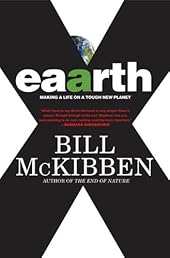
|
Eaarth: Making a Life on a Tough New Planet
|
Description"Read it, please. Straight through to the end. Whatever else you were planning to do next, nothing could be more important." —Barbara Kingsolver Twenty years ago, with The End of Nature, Bill McKibben offered one of the earliest warnings about global warming. Those warnings went mostly unheeded; now, he insists, we need to acknowledge that we've waited too long, and that massive change is not only unavoidable but already under way. Our old familiar globe is suddenly melting, drying, acidifying, flooding, and burning in ways that no human has ever seen. We've created, in very short order, a new planet, still recognizable but fundamentally different. We may as well call it Eaarth. That new planet is filled with new binds and traps. A changing world costs large sums to defend—think of the money that went to repair New Orleans, or the trillions it will take to transform our energy systems. But the endless economic growth that could underwrite such largesse depends on the stable planet we've managed to damage and degrade. We can't rely on old habits any longer. Our hope depends, McKibben argues, on scaling back—on building the kind of societies and economies that can hunker down, concentrate on essentials, and create the type of community (in the neighborhood, but also on the Internet) that will allow us to weather trouble on an unprecedented scale. Change—fundamental change—is our best hope on a planet suddenly and violently out of balance.
Editorial ReviewAmazon Best Books of the Month, April 2010: Since he first heralded our era of environmental collapse in 1989's The End of Nature, Bill McKibben has raised a series of eloquent alarms. In Eaarth, he leads readers to the devastatingly comprehensive conclusion that we no longer inhabit the world in which we've flourished for most of human history: we've passed the tipping point for dramatic climate change, and even if we could stop emissions yesterday, our world will keep warming, triggering more extreme storms, droughts, and other erratic catastrophes, for centuries to come. This is not just our grandchildren's problem, or our children's--we're living through the effects of climate change now, and it's time for us to get creative about our survival. McKibben pulls no punches, and swaths of this book can feel bleak, but his dry wit and pragmatic optimism refuse to yield to despair. Focusing our attention on inspiring communities of "functional independence" arising around the world, he offers galvanizing possibilities for keeping our humanity intact as the world we've known breaks down. --Mari Malcolm
|
|||||||||||||||
Become a fan of Book Presence on Facebook for the inside scoop on latest and most exclusive books.



